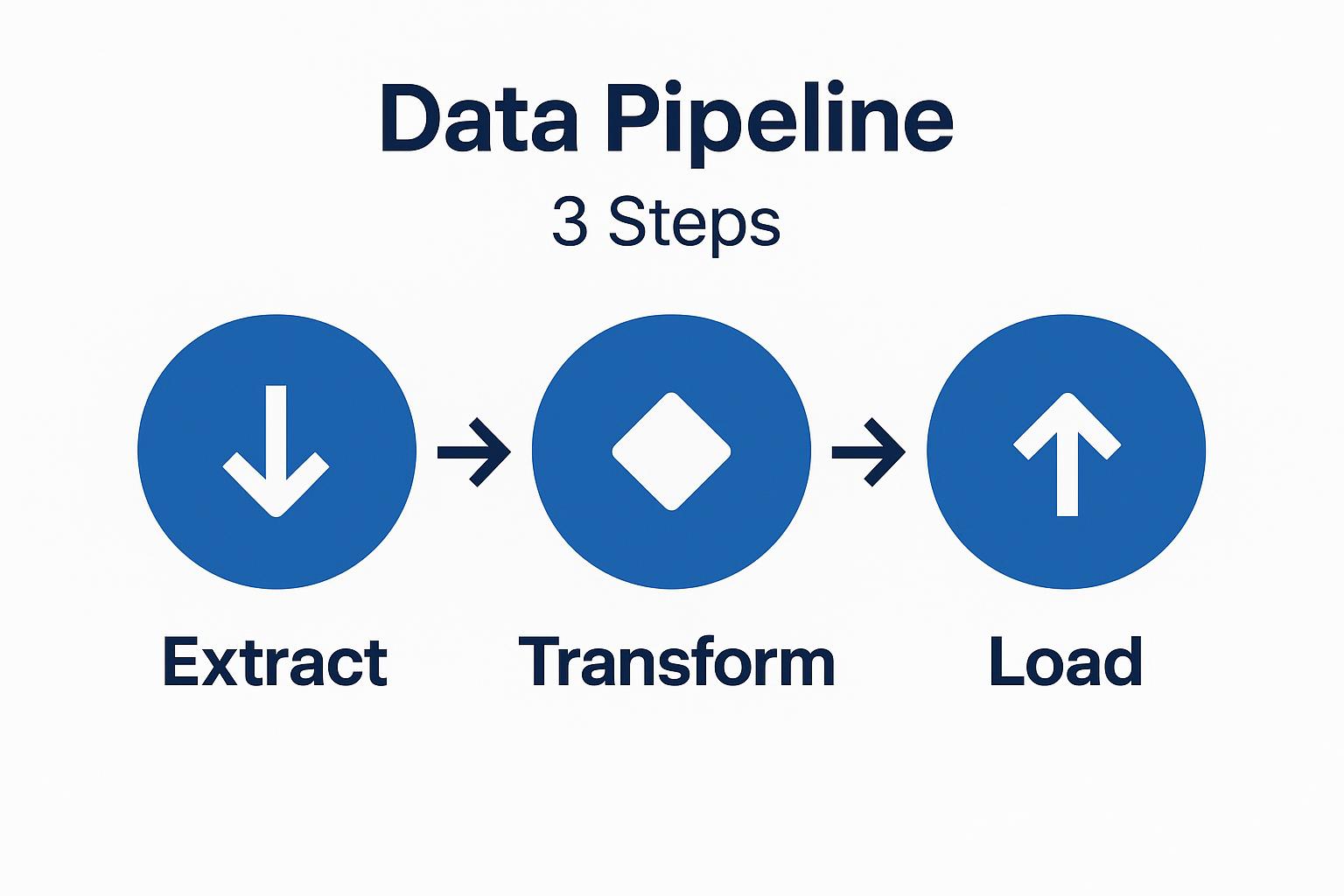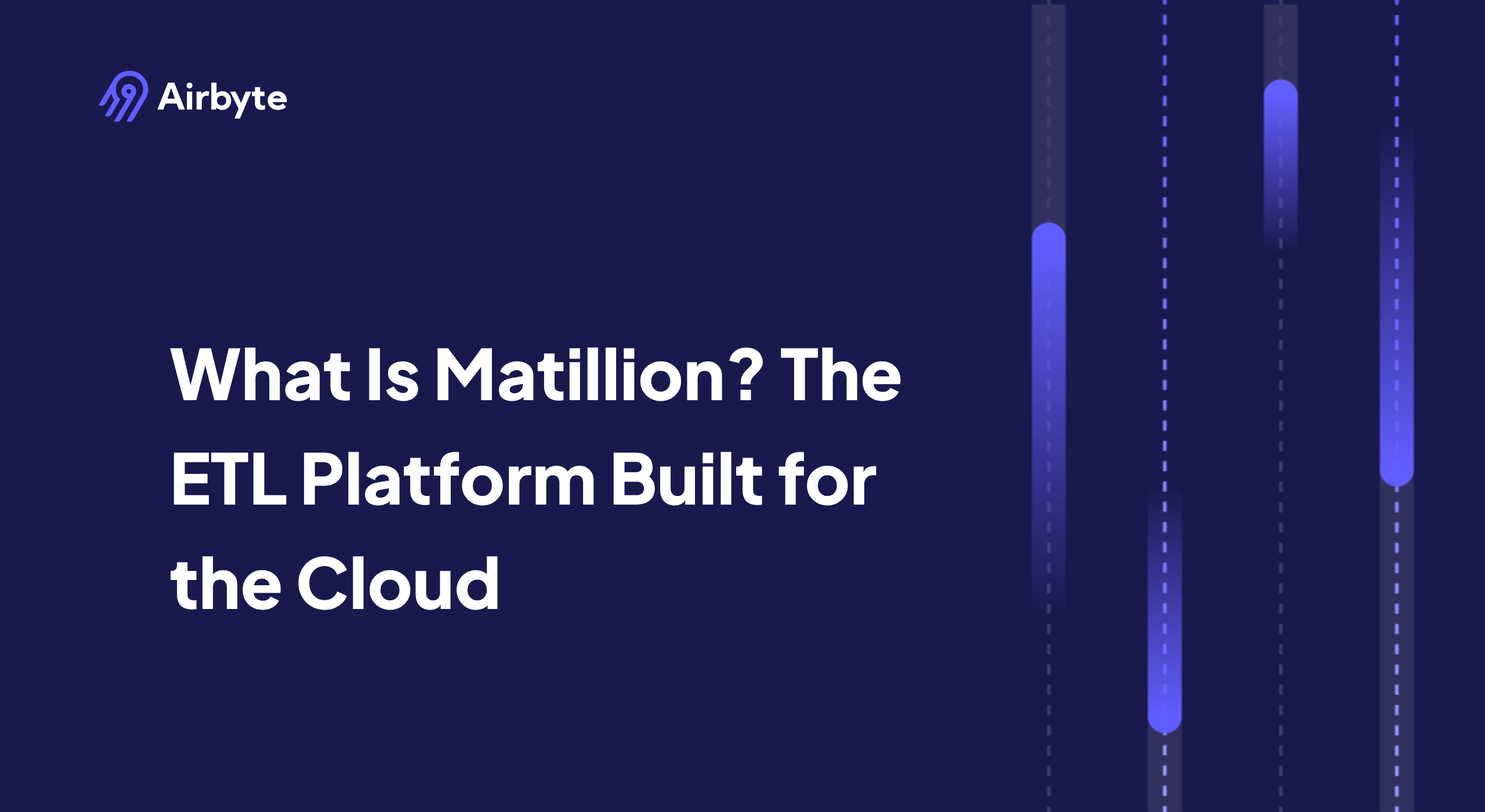What Is Matillion? The ETL Platform Built for the Cloud
Summarize this article with:
✨ AI Generated Summary
Matillion is a cloud-native ETL platform designed for seamless data integration and transformation with cloud data warehouses like Amazon Redshift, Snowflake, and Google BigQuery, featuring visual interfaces, pre-built connectors, and automation tools. However, its usage-based pricing, limited connector customization, and potential vendor lock-in may pose challenges for some organizations.
In contrast, Airbyte offers an open-source, flexible, and cost-effective alternative with extensive custom connector support, scalable deployment options, and a strong community, making it ideal for teams needing greater control and adaptability in managing complex data pipelines.
Matillion is a cloud-native ETL (Extract, Transform, Load) platform designed to streamline data integration and improve data productivity across cloud data platforms. It simplifies complex data pipelines, allowing organizations to manage data workflows efficiently. Matillion helps move data from multiple sources to target destinations like Amazon Redshift, Snowflake, and Google BigQuery.
As data volumes increase, teams need tools to handle the growing demands of real-time data processing. Matillion supports both technical and non-technical users, enabling them to automate data transformations and manage data pipelines.
By the end of this article, you'll learn about the key features and capabilities of Matillion, and how it fits into the broader landscape of cloud-native ETL tools.
What is ETL, and Why It’s Crucial for Data Teams?
ETL stands for Extract, Transform, and Load, which is the process used to gather data from various sources, transform it into a usable format, and load it into a data warehouse or other storage systems.
This process is essential for data teams as it enables the seamless integration of diverse data sources, ensuring that the data is clean, structured, and ready for analysis.
ETL is a critical part of the data pipeline because it allows businesses to prepare their data for reporting, analytics, and decision-making. By automating data movement and transformation, teams can reduce manual work, enhance data quality, and deliver valuable insights to drive business intelligence.
With the growing volume and complexity of data, an efficient ETL process is key to enabling data-driven decision making across organizations.

How Does Matillion Handle Data Transformation and Pricing?
Transforming Data
Data transformation is a critical step in the ETL process, where raw data is cleaned, structured, and prepared for analysis. Matillion, like other data integration platforms, provides tools to simplify this process. With visual interfaces and pre-built transformation components, users can design workflows to handle tasks such as filtering, aggregating, and joining data from different sources.
Common data transformation tasks include:
- Filtering: Removing unnecessary or irrelevant data.
- Sorting: Organizing data into a specific order based on predefined criteria.
- Aggregation: Summarizing large datasets to provide meaningful insights.
- Joining: Merging data from different sources to create a unified dataset.
Pricing: Understanding Usage-Based and Connector-Based Models
Matillion offers both usage-based and connector-based pricing models, where users are charged based on:
- Data Volume: Costs increase as more data is processed through the platform.
- Connector Usage: Users pay based on the number and type of connectors required for data integration.
- Transformation Jobs: Each transformation step may impact overall costs depending on its complexity and the volume of data processed.
What Are the Features of Matillion for Data Teams?
Matillion offers a range of features aimed at simplifying the ETL process for data teams, making it easier to integrate, transform, and load data into cloud data warehouses. Here are some of the main features of the platform:
Cloud-Native Architecture
A cloud-optimized architecture provides scalability and flexibility, making it easier to handle large datasets. These tools are designed to integrate seamlessly with popular cloud data platforms like Amazon Redshift, Snowflake, and Google BigQuery, reducing the need for managing on-premises infrastructure.
Pre-Built Connectors
Matillion comes with a variety of pre-built connectors that allow quick integration with a range of data sources, such as APIs, databases, and flat files. This simplifies the process of ingesting data from multiple sources into cloud data warehouses or other storage solutions.
Data Transformation
A visual interface for building and automating data transformations helps users—whether technical or non-technical—perform tasks like data cleansing, aggregation, and sorting.
Data Orchestration
Automation and scheduling features enable users to manage and execute complex ETL workflows more easily. These orchestration tools help monitor tasks, improving operational efficiency and reducing the manual effort required to maintain pipelines.
Security & Compliance:
Security features, such as encryption and role-based access controls, ensure that sensitive data is protected throughout the ETL process. The platform complies with key industry standards like GDPR and HIPAA.
The Hidden Trade-offs of Using Matillion
While Matillion offers many advantages for data teams looking to streamline their data integration and data transformation processes, there are several trade-offs that should be considered.
These trade-offs are typically related to pricing, flexibility, and control over data workflows, which can impact organizations depending on their data needs and data management strategies.
Pricing Structure
The usage-based pricing model can become costly as data volumes grow or when additional connectors are required. While this approach offers flexibility, organizations must carefully monitor their costs, especially as data teams scale their data pipelines and increase data processing.
Understanding how different factors, like data loading and transformation jobs, impact pricing is essential for effective budgeting.
Limited Customization for Connectors
Unlike open-source or self-hosted options, cloud-native ETL tools tend to offer fewer custom connector options. While many pre-built connectors are available for popular sources, organizations with unique or niche data sources may find this limiting. This could be a drawback for teams working with complex data integrations or less common platforms.
Vendor Lock-In
Many cloud-native ETL solutions are tightly integrated with specific cloud providers (e.g., AWS, Google Cloud, Snowflake). This integration can lead to vendor lock-in, making it more difficult to migrate to other platforms in the future. Organizations may find themselves reliant on a single provider, which could limit their flexibility or increase long-term costs.
Learning Curve for Advanced Features
While the user interface is designed to be accessible for non-technical users, more advanced data workflows or custom transformations may require additional technical expertise. Setting up complex features like custom scripting or integrating with non-standard data sources may pose challenges for teams without sufficient technical experience.
Operational Overhead for Complex Pipelines
As data operations grow in complexity, managing data workflows can require more resources. Even with automation features, intricate data transformations and large-scale pipelines may still demand significant manual oversight to ensure everything functions properly.
Matillion vs Airbyte: Which One is Best for You?
While both Matillion and other ETL platforms offer robust features for data teams, Airbyte stands out for its open-source flexibility, extensive connector library, and cost transparency, making it an ideal choice for teams seeking a customizable, scalable solution with greater control over their data integration workflows.
Its ability to support both cloud and self-hosted deployments ensures that organizations can tailor their data pipeline architecture to meet their unique needs, without being locked into a single cloud provider.
Why Data Teams Choose Airbyte Over Matillion
Data teams often turn to Airbyte instead of Matillion for its enhanced flexibility, data integration capabilities, and cost-effective approach to managing data pipelines. Here's why many prefer Airbyte as a data integration tool over Matillion:
- OSS Flexibility: As an open-source platform, Airbyte offers full control over data pipelines, empowering data engineers to customize workflows without being restricted by proprietary solutions like Matillion’s ETL framework.
- Custom Connector Support: Airbyte provides an easy way to create custom connectors, allowing teams to efficiently integrate a wide variety of data sources. This level of customization isn't as straightforward with Matillion, where connector options may be more limited for unique or niche data sources.
- Active Community: The open-source nature of Airbyte means it has a growing, active community that continuously contributes to improving the platform. This collaborative development keeps Airbyte at the cutting edge of data integration, helping teams manage increasing data volumes and evolve their data management strategies.
- Transparent Pricing: Airbyte provides a clear cost structure based on capacity, with free open-source options, offering transparency and predictability that can be more difficult to navigate with Matillion, where the pricing model can grow complex depending on usage.
- Rapid Connector Delivery: With tools like the Connector Development Kit (CDK), Airbyte enables teams to quickly deploy new connectors, facilitating faster integration across multiple data sources. This speed is especially crucial for data analysts looking to streamline data productivity.
- Deployment Freedom: Airbyte supports flexible deployment options, including cloud, hybrid, and on-premises, offering more control over how data pipelines are managed compared to Matillion, which is primarily cloud-based.
What Users Say: Testimonials and Migration Stories
- “Airbyte is ridiculously easy to use and really good at syncing incremental data or small data. If you're doing large full table reloads, it's not currently the best at that, but new tech is being deployed soon to allow us to parallelize those loads too. Try installing it locally on your machine using docker desktop and see what it can do. Like I said, really easy.”
- “Airbyte gives good support and I have also relied on their community. They offer good support, the amount of questions they have is quite a lot and in addition to the slack channels to solve problems they also offer other more direct contact such as Office Hours where they present demos and also support you in resolving doubts.”
- “Unlock Cost Savings and Accelerate Al Integration with Airbyte and Stop Wasting Your Time And Money By Asking What's New In Data.”
Take Control of Data Movement and Build a Smarter Ingestion Strategy
Matillion fits well for organizations committed to cloud-first, SQL-driven transformations inside Snowflake or Redshift. It helps teams centralize control, simplify the ETL process, and enable business-driven data driven decision making, especially where transformation workloads dominate.
But for enterprises handling complex data pipelines, high data volume, and evolving integration needs, Airbyte delivers broader ingestion capabilities, faster deployment, and scalable control. Whether you're building a data productivity strategy or simply need a better way to handle ingestion, Airbyte supports the full data pipeline, from source to target destination without compromise.
If your data strategy includes custom sources, complex tasks, or evolving governance needs, it may be time to reconsider your ETL foundation. Airbyte meets teams where they are and grows as your infrastructure, data ecosystem, and needs evolve.
Start building faster, more flexible data pipelines today with Airbyte — the integration platform built to match your team’s evolving data needs.
Frequently Asked Questions
How does Airbyte enable organizations to handle increasing data volumes?
Airbyte helps organizations manage increasing data volumes by offering scalable data ingestion and transformation capabilities. It provides the flexibility to integrate with over 600 data sources and supports unlimited users, enabling teams to handle large-scale data loading efficiently while maintaining control over costs and performance.
Can I integrate Git with Airbyte?
Yes, Airbyte supports Git integration, allowing advanced users to manage version control for data pipelines. This enables more efficient collaboration, as changes to the pipelines can be tracked and managed through a Git-based workflow, improving data productivity and team collaboration.
What is the difference between Matillion ETL and other data integration tools?
Matillion ETL focuses on cloud-native environments, simplifying data integration tasks for cloud data warehouses. It provides powerful transformation capabilities but lacks the flexibility offered by open-source solutions like Airbyte.

.webp)
